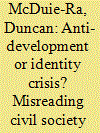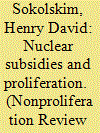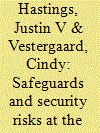|
|
|
Sort Order |
|
|
|
Items / Page
|
|
|
|
|
|
|
| Srl | Item |
| 1 |
ID:
079632


|
|
|
|
|
| Publication |
2007.
|
| Summary/Abstract |
This paper discusses the complex relationship between civil society and development in Asia by examining the role of ethnic identity in anti-development movements. Local and transnational movements by civil society actors against dams, mines, and deforestation have gained increased attention in academia and activist circles in the last decade, often used as evidence in arguments that development as part of neo-liberalism and/or state-led socialism is faltering. Furthermore, tribal, indigenous, and minority communities are often portrayed as having a closer relationship to the environment, which is seen as instrumental in their opposition to development projects. While agreeing with these arguments to some extent, this paper examines the local context of anti-development movements using research from fieldwork in the Indian state of Meghalaya and argues that struggles over development projects are also struggles over ethnic identity. In Meghalaya, civil society actors from the Khasi ethnic group have opposed several large development projects on the +grounds that these projects will attract labourers from Bangladesh and other parts of India, threatening the survival of the Khasi ethnic group. Damage to the environment, livelihoods, and loss of land are rarely a concern. The failure to recognize the influence of ethnic identity politics in critiques of development raises the risk of misreading both the extent of anti-development sentiments in civil society and the potential for development projects to be reframed by proponents into an acceptable ethnic guise. Furthermore, the actors contesting development through identity politics are overwhelmingly from urban areas, leaving rural people with limited access to civil society. This paper attempts to add a critical perspective to current literature on development and civil society using empirical examples from one of the least researched regions in Asia
|
|
|
|
|
|
|
|
|
|
|
|
|
|
|
|
| 2 |
ID:
144294


|
|
|
|
|
| Summary/Abstract |
In March 2015, the South Australian state government established a royal commission to investigate the financial, social, technical, diplomatic, and nonproliferation benefits and risks of expanding its nuclear industry, including activities related to uranium mining; enriching, reprocessing, and fabricating nuclear fuels for both domestic use and export; producing nuclear power; and storing radiological waste, including foreign spent reactor fuel. Given its enormous uranium reserves and current mining activities, some Australians have argued that Australia could benefit financially by expanding the mining sector and by adding value to its uranium exports by enriching the material and fabricating it into reactor fuel assemblies. Others have maintained that Australia can realize significant economic benefits by recycling and storing foreign spent fuel and producing carbon-free nuclear power. In the end, the commission recommended that Australia consider opening up a high-level waste repository to take in foreign spent fuel. It did not recommend any other nuclear activities at this time. The following viewpoint is based on testimony I delivered to the commission on the nuclear weapon proliferation implications of the proposed activities. If Australia wants to avoid the temptation of selling nuclear goods to states that might use these goods to make bombs, it should only consider new nuclear activities that can be entirely financed by the private sector and turn a profit without having to resort to foreign sales. This policy would also enable Australia to set an important, new international nonproliferation standard.
|
|
|
|
|
|
|
|
|
|
|
|
|
|
|
|
| 3 |
ID:
167795


|
|
|
|
|
| Summary/Abstract |
Historically, there have been limited international controls at the very front end of the nuclear fuel cycle, which consists of mining, processing, transportation, and conversion of natural uranium. However, an evolving framework of nuclear-security treaties along with International Atomic Energy Agency clarifications of the materials subject to its safeguards obligations are increasing the coverage of source materials, raising the question of how new and traditional uranium suppliers should handle safeguards and security in the production of uranium. We use a risk framework to assess the likelihood and consequences of different proliferation risks. Although the consequences for proliferation are generally low, risks to the very front end are different for safeguards (state diversion) and nuclear-materials security (unauthorized removal by non-state actors). For safeguards risks, cases of diversion or undeclared activities are concentrated at conversion facilities, while theft or trafficking of front-end material represents a relatively small percentage of total security incidents, concentrated in countries with lower levels of nuclear-materials security. We conclude that safeguards and security obligations should be commensurate with the risks. An appropriate response should involve a risk-based, graduated approach to nuclear security and a flexible, more clearly framed approach to safeguards.
|
|
|
|
|
|
|
|
|
|
|
|
|
|
|
|
|
|
|
|
|